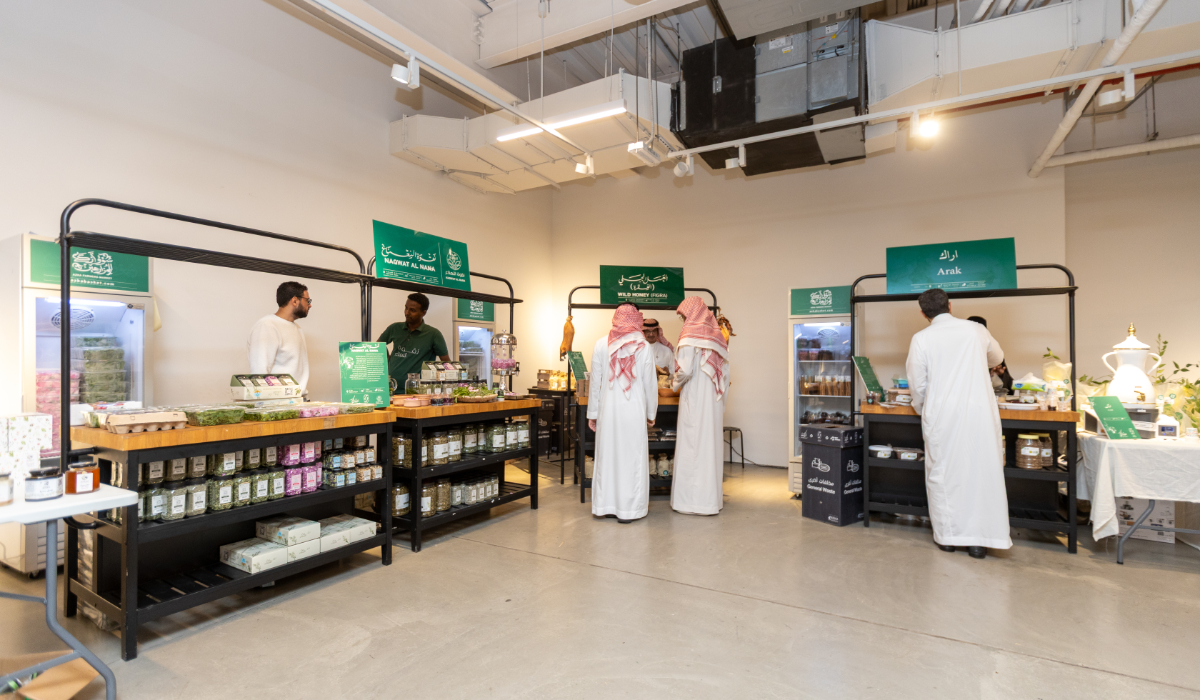JEDDAH: Starting this month, the two-day Azka Farmer’s Market will take place every month at Hayy Jameel.
The market is not just a shopping destination for fresh produce, but also a platform for cultivating awareness around healthy food choices, sustainability and Saudi Arabia’s rich agricultural heritage.
Visitors can explore the best of locally grown seasonal fruits, vegetables and grains, as well as bread and other specialty items sourced from farms and producers from across the Kingdom.

At Azka Farmer’s Market visitors can explore locally grown produce and other specialty items sourced from farms and producers from across the Kingdom. (Supplied)
Organized as part of Art Jameel’s community programming under the Hayy Markets initiative, the market creates an ideal atmosphere for families and food lovers. It also features a chef’s corner, Azka’s specialty coffee pop-up, free public programming and engaging activities for children at Hayy Explorers, including drawing stations and reading areas.
Zaki Kamel, Azka Foods founder, told Arab News: “We are trying to reach an ethical food system and self-sufficiency based on the ethics of food production, which I understood from the Qur’an over the last eight years of contemplation.”
He said that organisers were working with more than 74 food vendors from around the Kingdom in categories ranging from honey and dairy to vegetables, fruits and meat.

At Azka Farmer’s Market visitors can explore locally grown produce and other specialty items sourced from farms and producers from across the Kingdom. (Supplied)
“As Saudi Arabia, we can reach ethical foods and self-sufficiency. This monthly farmer’s market at Hayy Jameel is a step toward that. It offers an alternative to the modern supermarket model of sourcing food, where the consumer is directly connected with the producer and farmer,” he said.
“We can hopefully export this philosophy of ethics to the rest of the world.”
Each month, 16 booths from producers and farms across the region will be featured.

At Azka Farmer’s Market visitors can explore locally grown produce and other specialty items sourced from farms and producers from across the Kingdom. (Supplied)
“For the farmers who cannot have a booth, we have the ‘Azka Selection’ section where we take the responsibility of selling their produce for them,” Kamel said.
One of the core elements of the Azka Farmer’s Market is interaction and education. Visitors can meet producers face-to-face, ask questions during Q&A sessions, and attend panel discussions with key figures in the local agricultural community.
On April 11, the first day of the market’s new season, a panel hosted Jassim Almughrabi, the first organic honey producer in Saudi Arabia and owner of Mugribi Apiaries Est.
He shared insights into the differences between organic and conventional beekeeping, drawing from his expertise as a former honeybee specialist at the Saudi Ministry of Environment, Water and Agriculture.
“We discussed which honey is better organic or regular — and explored the lives of bees that stay in one place all year versus those moved seasonally,” Almughrabi said.
“Many people attended, asked questions, and left with new knowledge. They were very happy about the material, and I hope we meet again for another discussion in the future.”
Panel discussions were also held the following day with producers from Baha, who cultivate ancient strains of wheat and grains, and food historians from Lebanon and Canada, who explored Saudi Arabia’s culinary history and its global connections.
Nagwat Al-Nanaa Farms, an award-winning organic farm based in Madinah, is among the local food producers at the market.
Fahad Al-Raddadi, CEO of the farm, said: “Our farm was proudly recognized as the best farm in Madinah in 2021 and 2022, a reflection of our commitment to quality and sustainability.
After five years in the market, Nagwat Al-Nanaa earned its organic production certification with the support of Azka Foods.
“Ahmad Kamel played a crucial role in guiding us through the certification process, helping us formalize and validate the organic practices we had already embraced. The farmers market always proves to be a major success and opened the door to a broader network within the local agricultural community,” he said.
“Our journey has also taken us beyond Saudi borders. We were honored to be one of 22 companies selected to represent Saudi Arabia internationally, participating in events across Italy, the UK, Australia, Japan, and more in collaboration with the Ministry of Culture and the Culinary Arts Commission.”
Alongside the stalls and panels, the Hayy Cinema screens related films such as “Flow” and “Thank You For Banking With Us,” weaving culture and conversation into the market experience.
The next Azka Farmer's Market event will be held on May 9 and 10.































